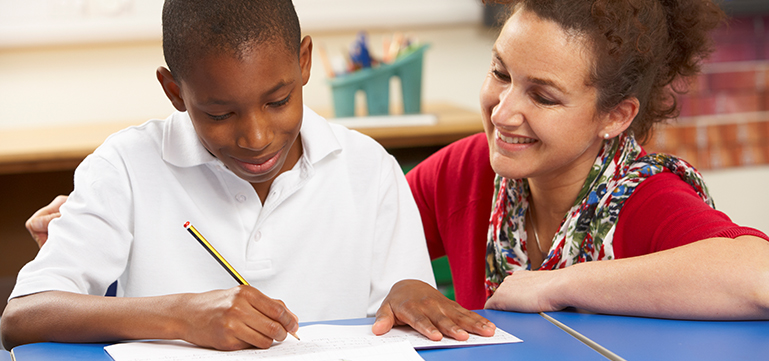Improving writing skills

Quick links:
Information about the school
Ysgol y Garnedd is a designated Welsh-medium community school, which serves the city of Bangor and the nearby villages. There are 334 pupils between 3 and 11 years old on roll, including 32 nursery pupils. They are organised into 12 mixed-age classes. On average over the last three years, 7.5% of pupils have been eligible for free school meals, which is lower than the national average of 18%. There are currently slightly over 12% of pupils on the additional learning needs register, which is lower than the national percentage of 21%, and a very few have a statement of special educational needs.
Context and background to the effective or innovative practice
The school has a strategic ambition to improve and raise standards continuously. Improving extended writing had been a whole-school priority in 2016 – 2017. Firstly, provision and opportunities to write at length were reviewed by:
- looking at current provision in terms of long and medium-term schemes of work
- identifying and reviewing opportunities for pupils to write at length across the curriculum
- conducting whole-staff and departmental staff meetings to adapt plans and experiences for pupils
- looking at the accuracy of pupils’ oracy as a means of developing accurate writing
- reviewing the process of writing in small steps so that pupils can be equipped to achieve successfully
Through rigorous self-evaluation, it was decided that oral accuracy and language patterns would need to be ensured in order to develop written work further. It was also decided that it was essential for pupils to be equipped with the necessary skills to complete extended writing tasks across the curriculum.
Description of the nature of the strategy or activity
As a result of findings from monitoring provision, the school decided that a series of language skills lessons would be planned in order to equip and prepare pupils for writing at length. In addition, the school ensured that pupils were inspired and motivated to complete written tasks by taking part in educational visits before undertaking the written tasks. The school decided that equipping pupils with relevant skills, inspiring them through visits and the process of evaluating written models were valuable in order to develop and prepare them to complete extended writing work successfully.
What impact has this work had on provision and learners’ standards?
The school measured the effect of action by scrutinising pupils’ work and books. Nearly all pupils were seen to have improved their ability to create extended pieces of writing across the curriculum. When samples of writing were looked at across the school, a number of writing tasks of a very high standard were seen to have been completed. The school has now adapted plans and provision in order to stimulate, prepare and model work before pupils start on their written work. The school places a clear emphasis on the need for pupils to practise and learn oral language patterns. This has had a definite influence on the quality of their written work. As a result, most pupils succeed in creating written work of a high standard across the curriculum in both languages.
How have you shared your good practice?
The school has shared its good practice with staff in the local authority and in local primary and secondary schools. The school has also taken part in joint scrutiny sessions with other schools in the catchment area.